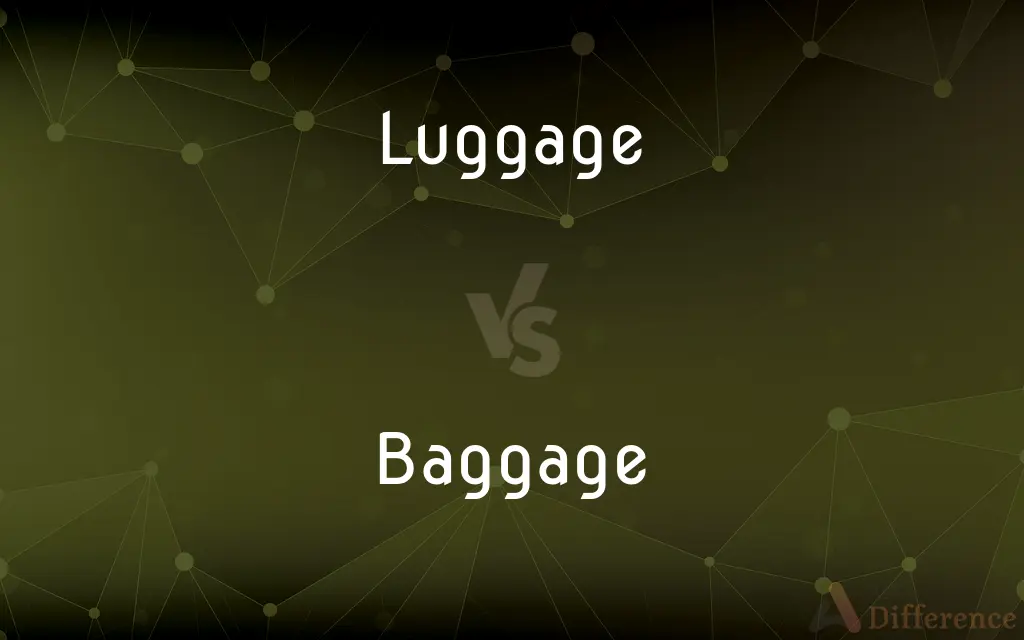Luggage vs. Baggage — What's the Difference?
Edited by Tayyaba Rehman — By Fiza Rafique — Updated on September 26, 2023
Luggage and Baggage both refer to personal items packed for travel; "luggage" often implies suitcases, while "baggage" has a broader sense, including emotional or past burdens.

Difference Between Luggage and Baggage
Table of Contents
ADVERTISEMENT
Key Differences
Luggage typically pertains to the cases, suitcases, and containers used to carry personal belongings during travel. Baggage, while often synonymous with Luggage, can have a wider implication, referring to all the personal effects one carries, including suitcases and hand-carried items.
In everyday speech, people might use Luggage when discussing specific types of travel containers, like a luggage set or a piece of luggage. Baggage, on the other hand, tends to be used more generically, addressing all items brought along, or sometimes, the collective weight and dimension of these items.
The word Baggage also bears a metaphorical meaning, denoting the intangible burdens, past experiences, or emotional encumbrances someone might carry. Luggage, while primarily referring to physical items, doesn't commonly take on such metaphorical interpretations.
While both terms can often be used interchangeably in the context of travel, the choice between them might be dictated by regional preferences. For instance, "baggage claim" is a commonly used term at airports, whereas one might refer to "luggage storage" at a hotel.
Comparison Chart
Primary Use
Suitcases and travel containers.
All personal items for travel.
ADVERTISEMENT
Context
Specific types of travel items.
More generic or collective term.
Metaphorical Use
Rarely used metaphorically.
Can imply emotional burdens.
Common Phrases
"Luggage storage", "luggage set".
"Baggage claim", "excess baggage".
Regional Preferences
Often interchangeable, but may vary by region.
Commonly used across regions.
Compare with Definitions
Luggage
Luggage can indicate a specific set of travel items.
His Luggage consists of two suitcases and a backpack.
Baggage
Baggage encompasses all personal effects during travel.
She always travels with a lot of Baggage.
Luggage
Luggage can be stored or checked in during travel.
The hotel offers a Luggage storage service.
Baggage
Baggage is a generic term for travel items.
Your Baggage must be checked in before the flight.
Luggage
Luggage refers to cases and containers for travel.
She bought new Luggage for her European tour.
Baggage
Baggage can be hand-carried or checked in.
Make sure to keep valuables in your hand Baggage.
Luggage
Luggage often implies suitcases and similar items.
I need to pack my Luggage for tomorrow's trip.
Baggage
Baggage can imply both physical and emotional burdens.
He carries a lot of emotional Baggage from his past.
Luggage
Luggage is used for carrying personal items.
His Luggage was lost during the flight.
Baggage
Baggage or luggage consists of bags, cases, and containers which hold a traveller's personal articles while the traveler is in transit. A modern traveller can be expected to have packages containing clothing, toiletries, small possessions, trip necessities.
Luggage
Containers for a traveler's belongings.
Baggage
The trunks, bags, parcels, and suitcases in which one carries one's belongings while traveling; luggage.
Luggage
The cases and belongings of a traveler.
Baggage
The movable equipment and supplies of an army.
Luggage
(uncountable) The bags and other containers that hold a traveller's belongings.
Baggage
Emotions or thoughts that stem from painful or unpleasant past experiences and that affect one's outlook or behavior
"I lugged a considerable amount of psychological baggage from my adolescence" (Stephen S. Hall).
Luggage
(uncountable) The contents of such containers.
Baggage
A woman prostitute.
Luggage
A specific bag or container holding a traveller's belongings.
Baggage
A girl or young woman, especially one is who impudent.
Luggage
That which is lugged; anything cumbrous and heavy to be carried; especially, a traveler's trunks, baggage, etc., or their contents.
I am gathering up my luggage, and preparing for my journey.
What do you mean,To dote thus on such luggage!
Baggage
(uncountable) Portable cases, large bags, and similar equipment for manually carrying, pushing, or pulling personal items while traveling
Please put your baggage in the trunk.
Luggage
A case used to carry belongings when traveling
Baggage
Factors, especially psychological ones, which interfere with a person's ability to function effectively.
This person has got a lot of emotional baggage.
Baggage
A woman.
Baggage
An army's portable equipment; its baggage train.
Baggage
The clothes, tents, utensils, and provisions of an army.
Baggage
The trunks, valises, satchels, etc., which a traveler carries with him on a journey; luggage.
The baronet's baggage on the roof of the coach.
We saw our baggage following below.
Baggage
Purulent matter.
Baggage
Trashy talk.
Baggage
A man of bad character.
Baggage
A woman of loose morals; a prostitute.
A disreputable, daring, laughing, painted French baggage.
Baggage
A romping, saucy girl.
Baggage
A case used to carry belongings when traveling
Baggage
A worthless or immoral woman
Baggage
Baggage has weight and size restrictions in travel.
Excess Baggage fees can be expensive on some airlines.
Common Curiosities
Can Luggage be used metaphorically like Baggage?
While primarily physical, Luggage isn't commonly used metaphorically like Baggage.
Is there a significant difference between Luggage and Baggage?
Both refer to travel items, but Luggage often implies suitcases, while Baggage is broader.
What do you find at the airport related to these terms?
"Baggage claim" is a common area where you retrieve checked items.
Is it correct to say "carry-on Luggage"?
Yes, it indicates Luggage you can take with you in the cabin of a plane.
Is "luggage set" a common phrase?
Yes, it refers to a matching set of travel containers.
Can Baggage be both checked in and hand-carried?
Yes, Baggage can be either checked in or hand-carried during flights.
Can "Baggage" have metaphorical meanings?
Yes, Baggage can imply emotional or past burdens someone might carry.
Which term indicates specific travel containers?
Luggage often indicates specific types of travel containers.
What does "excess Baggage" mean?
It refers to Baggage that exceeds weight or size limits on transportation.
Is "Luggage cart" a term used for transporting travel items?
Yes, a "Luggage cart" is used to transport multiple pieces of Luggage.
What's a common term for storing Luggage at a hotel?
It's often referred to as "Luggage storage."
Can Baggage imply both tangible and intangible items?
Yes, while often physical, Baggage can also mean emotional or past burdens.
Do all airlines have Baggage fees?
Not all, but many airlines charge for excess or additional Baggage.
Does Luggage only mean suitcases?
While it often implies suitcases, Luggage can refer to other travel containers too.
Can Luggage and Baggage be used interchangeably?
Often yes, especially in travel contexts, but nuances exist between them.
Share Your Discovery

Previous Comparison
Resolute vs. Resolve
Next Comparison
Namaskar vs. NamasteAuthor Spotlight
Written by
Fiza RafiqueFiza Rafique is a skilled content writer at AskDifference.com, where she meticulously refines and enhances written pieces. Drawing from her vast editorial expertise, Fiza ensures clarity, accuracy, and precision in every article. Passionate about language, she continually seeks to elevate the quality of content for readers worldwide.
Edited by
Tayyaba RehmanTayyaba Rehman is a distinguished writer, currently serving as a primary contributor to askdifference.com. As a researcher in semantics and etymology, Tayyaba's passion for the complexity of languages and their distinctions has found a perfect home on the platform. Tayyaba delves into the intricacies of language, distinguishing between commonly confused words and phrases, thereby providing clarity for readers worldwide.
















































